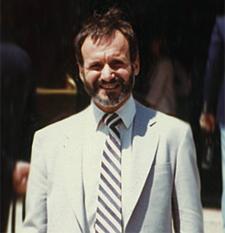Former federal public servant Paul Richard just wants some justice, but it would appear that justice is only for those who file swiftly and Richard is 20-some-odd years late to the game.
In 2005, he filed a complaint with the Canadian Human Rights Commission against the Treasury Board of Canada for discrimination based on sexual orientation. Since then, his request to have his complaint heard has been refused twice and appealed twice. Richard is desperately hoping that the third time before the Commission’s a charm.
Richard worked as an economist for the federal government in several departments and ministries from the early 1970s until 1985, when the near-constant organizational restructuring finally pushed him out. In his original complaint, he chronicled his experience of being shuffled from department to department to department and finally, out the door.
Richard, now 58, feels he was left out in the cold for being an openly gay man.
He claims his supervisors used negative performance evaluation reports, reorganization and even intimidation as tools for discrimination. He maintains that at the time, the concept of gay rights was “virtually unknown,” and he did not realize these events were motivated by systemic homophobia. When he sought the help of his union and of lawyers, he found that no one would advocate on his behalf because he was gay, and as he said in some of his documentation, “gay rights were not a cause to be defended [then].” (Discrimination against sexual orientation was only written into the Canadian Human Rights Act in 1996.)
At this point — in 1985 — Richard sank into a clinical depression, a condition with which he is still struggling. “The journey up until this point has been very difficult for me,” he says. He argues that the discrimination he faced was so traumatic he still suffers the consequences of it, and that his depression, coupled with other health problems and taking care of his now-deceased mother, made it impossible for him to file his complaint before 2005.
In 2007, the CHRC disagreed, refusing to hear his request because it had expired under the one-year statute of limitations. A year later, the CHRC’s refusal was overturned by a federal court judge, who deemed not only that the CHRC’s decision was flawed, but also that it failed to provide a reason for not even considering using its discretion to hear Richard’s case even though it was technically time barred. The judge mandated Richard’s case be placed once again in front of the CHRC for re-evaluation. In 2009, the Treasury Board concluded they could not locate any of Richard’s witnesses in their database, and even if they could find them, the events happened so long ago that it would be an onerous burden to find someone who could recall the events in question.
In Richard’s most recent application for judicial review, he cites a letter the Treasury Board wrote to the CHRC that mentions that the Treasury Board would be “seriously prejudiced in its ability to provide a full answer and defence in relation to Mr Richard’s allegations” because so much time had elapsed. The letter also states the Treasury Board conducted a search in its Government Employment Database and came up empty-handed when it searched for Richard’s 19 named witnesses, most of whom were his managers and co-workers responsible for carrying out much of the alleged discrimination outlined in his complaint.
Richard asserts that they’re simply looking in the wrong place. In his sworn affidavit dated Oct 6, 2009, he says that retired government employees would not be in the database, but presuming they are still collecting their pensions, they should not be that difficult to find. During the appeals process, Richard himself did a Canada 411 search on the Internet and within minutes found addresses and phone numbers of several of his named witnesses.
“They know damn well they can find these witnesses,” he says.
The obstacles in navigating the legal system aren’t the only ones Richard has been going up against. He points out that if he is successful in his appeal and the CHRC finally hears his case, he will be suing for restitution, which will set a precedent for hundreds of gays who could sue for compensation for loss of employment due to discrimination. But now, much like 20 years ago, Richard says he finds himself mostly fighting alone, with little backing from the gay community. It’s been a lonely road for Richard, but he’s willing to stick it out. “That chapter needs to be rewritten,” he says of the institutional discrimination against gays in Canada’s past.
He hopes his case is the exception that breaks the rule on the one-year statute of limitations on human rights complaints.
“When a person has been abused psychologically, there should be no limit,” Richard says. “They should always be potentially catch-able, to repair the damage.”
Richard is presently awaiting the Attorney General office’s presentation of its defence. He hopes to be before a judge again this winter to have his case dealt with by the CHRC.
Read the full Richard v Treasury Board 2008 judgment:
Canlii.org/en/ca/fct/doc/2008/2008fc789/2008fc789.html


 Why you can trust Xtra
Why you can trust Xtra


